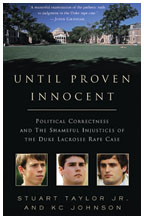November 21, 2007: Books and Arts
Reading Room
Until proven innocent
Stuart Taylor ’70 chronicles the Duke lacrosse rape case
High school high jinks in Puerto
Rico
Tony Vallés ’97 makes a Spanish-language teen film
For a complete list of books received, click here.
Stuart Taylor ’70’s new book goes beyond the legal facts and assesses the role of the Duke faculty and the media in the affair. (courtesy Stuart Taylor ’70) |
Reading
Room
Until
proven innocent
Stuart Taylor ’70 chronicles the Duke lacrosse rape case
By Katherine Hobson ’94
Stuart Taylor ’70 has covered law for more than 25 years as a reporter and columnist at publications including The New York Times, National Journal, and Newsweek. But he says it’s rare to see a case of prosecutorial misconduct as blatant as the 2006 accusations of rape against three Duke lacrosse players. Usually, he says, misconduct only is discovered after the fact. He contends that, in this case, you could see it happening day by day, as prosecutor Michael Nifong asserted things that simply weren’t true. Nifong, says Taylor, “was trying to put into prison for 30 years people he had strong reasons to believe were innocent.”
Taylor and his co-author, Brooklyn College history professor and blogger KC Johnson, chronicle the affair in Until Proven Innocent: Political Correctness and the Shameful Injustices of the Duke Lacrosse Rape Case, published by Thomas Dunne Books in September. The book goes beyond the legal facts and assesses the role of the Duke faculty and the media in the affair, which ended with the three young men declared innocent by the North Carolina attorney general, Nifong being disbarred, and Duke’s president apologizing for abandoning the players.
 Taylor,
a lawyer as well as a journalist, heard from a Princeton friend whose
son was on the team that the case as initially presented in the media
was dubious. After getting a look into the evidence the prosecutor handed
over to the defense as part of the discovery process, Taylor says he was
99 percent sure that the charges were fraudulent.
Taylor,
a lawyer as well as a journalist, heard from a Princeton friend whose
son was on the team that the case as initially presented in the media
was dubious. After getting a look into the evidence the prosecutor handed
over to the defense as part of the discovery process, Taylor says he was
99 percent sure that the charges were fraudulent.
The book examines the litany of errors: Nifong never interviewed the alleged victim but said publicly that he knew she had been raped, despite an absence of medical evidence. He refused to see evidence from two of the accused that they weren’t at the party when the alleged rape took place. And he and police violated protocol when they put together a photo lineup made up entirely of lacrosse players.
The authors say Nifong was far from the only person at fault. According to them, many members of the faculty seized on the opportunity to advance an agenda based on assumptions of persistent racial, gender, and class oppression. And the media couldn’t resist the historically and politically charged narrative of rich white jocks sexually assaulting a single black mother from the other side of the tracks.
The authors acknowledge the reputation of lacrosse players in general and at Duke specifically as hard-drinking bullies. Taylor says he heard reports of boorish behavior by the 2006 squad, but that on close inspection, there was no evidence of serious misbehavior that hurt or threatened anyone else. The global lesson for universities and everyone else, he says: Beware of stereotyping.
The lacrosse players have been able to get on with their lives, Taylor
suspects, because the state’s attorney general took the unusual
step of declaring that they were innocent, not just that there wasn’t
enough evidence to prosecute them. Taylor ends the book with a quote from
the panel that disbarred Nifong, in which the commission’s chairman
said he hoped the case would “be a reminder to everyone that it’s
the facts that matter.”
![]()
Katherine Hobson ’94 covers health and medicine at U.S. News & World Report.
For a complete list of books received, click here.
Tony Vallés ’97 produced his film on a shoestring budget. (courtesy Tony Vallés ’97) |
High
school high jinks in Puerto Rico
Tony Vallés ’97 makes a Spanish-language teen
film
By Maurice Timothy Reidy ’97
When Tony Vallés ’97 and his brother, Jaime, decided to make a movie several years ago, they wanted to make one that they would have liked to watch growing up: a high school comedy set in their native Puerto Rico. As teenagers, they were fans of American films like Ferris Bueller’s Day Off and The Breakfast Club, but there was nothing like that in Puerto Rican cinema.
With zero experience in the film business, the Vallés brothers wrote, directed, and edited Casi Casi — roughly translated “just barely” — a Spanish-language film that ran for four weeks in Puerto Rico earlier this year and is airing on HBO this fall. HBO held a screening in New York on Oct. 1 to kick off its Hispanic Heritage Month celebrations, and also has released it on DVD. (The film has English subtitles in the HBO version.)
Casi Casi was a first for Puerto Rican cinema, which hadn’t produced films aimed at the teen market, says Tony Vallés, a classically trained singer and opera buff who is the director of communications for Prospect Theater, a New York theater company started by Vallés and other Princetonians in 1998. Tony and Jaime, a painter and sculptor, decided to set the film on their home island to “give something back” to the community — and because they could do it inexpensively.
Their choice of story, they freely admit, was dictated largely by their shoestring budget. They could convince their old high school in Puerto Rico to let them shoot there over the summer, they reasoned.
Tony and Jaime, a Cornell grad, also recruited family to help. Their aunt, Puerto Rican television actress Marian Pabón, played the stern principal, and their cousin, Mario Pabón, took on the role of Emilio, a love-struck junior who decides to run for class president to impress the most popular girl in school, only to learn that she intends to run herself. High jinks ensue.
They had some help from their friends, including composer Peter Mills ’95, a founder of Prospect Theater, who scored the film. Winner of an audience award at the 2006 San Diego Latino Film festival, Casi Casi also stars Irene Lucio ’08, a native of Puerto Rico, as the principal’s pet who agrees to help Emilio win the presidency.
The Vallés brothers already are working on their second script,
a thriller, on nights and weekends. Says Tony: “We want to make
lots more movies.” ![]()
Maurice Timothy Reidy ’97 is online editor of America magazine.
 American
Places: A Writer’s Pilgrimage to Sixteen of This Country’s
Most Visited and Cherished Sites — William Zinsser ’44
(Paul Dry Books). The author visited 16 iconic tourist sites, including
the Alamo, Mount Rushmore, and Disneyland, and interviewed the people
who take care of the landmarks, such as park rangers, curators, and town
historians. He provides their impressions and his own of why millions
of people visit these places each year. Zinsser is also the author of
On Writing Well.
American
Places: A Writer’s Pilgrimage to Sixteen of This Country’s
Most Visited and Cherished Sites — William Zinsser ’44
(Paul Dry Books). The author visited 16 iconic tourist sites, including
the Alamo, Mount Rushmore, and Disneyland, and interviewed the people
who take care of the landmarks, such as park rangers, curators, and town
historians. He provides their impressions and his own of why millions
of people visit these places each year. Zinsser is also the author of
On Writing Well.
 The Entitled:
A Tale of Modern Baseball — Frank Deford ’61 (Sourcebooks).
The main character in this novel, Howie Traveler, never made it as a player
in Major League Baseball, but worked his way up the coaching ladder. When
he finally gets his shot as manager of the Cleveland Indians, Traveler
has to learn to handle his team’s megastar — homerun slugger
Jay Alcazar, who has a big ego — or Traveler’s managing career
will be over. Deford is a senior contributing editor at Sports Illustrated.
The Entitled:
A Tale of Modern Baseball — Frank Deford ’61 (Sourcebooks).
The main character in this novel, Howie Traveler, never made it as a player
in Major League Baseball, but worked his way up the coaching ladder. When
he finally gets his shot as manager of the Cleveland Indians, Traveler
has to learn to handle his team’s megastar — homerun slugger
Jay Alcazar, who has a big ego — or Traveler’s managing career
will be over. Deford is a senior contributing editor at Sports Illustrated.
 “So
What Are You Going to Do with That?”: Finding Careers Outside Academia
— Susan Basalla *97 and Maggie Debelius *00 (University of Chicago
Press). The authors offer advice to scholars looking for nonacademic jobs.
They cover topics ranging from interview etiquette and résumé-writing
to translating skills learned in graduate school into terms a potential
employer can appreciate. Basalla works in higher-education marketing for
the consulting firm Art and Science Group. Debelius is director of the
Georgetown University Writing Center.
“So
What Are You Going to Do with That?”: Finding Careers Outside Academia
— Susan Basalla *97 and Maggie Debelius *00 (University of Chicago
Press). The authors offer advice to scholars looking for nonacademic jobs.
They cover topics ranging from interview etiquette and résumé-writing
to translating skills learned in graduate school into terms a potential
employer can appreciate. Basalla works in higher-education marketing for
the consulting firm Art and Science Group. Debelius is director of the
Georgetown University Writing Center. ![]()
By K.F.G.


